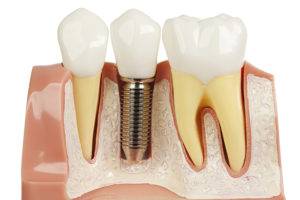What’s a dental implant surgery?
A dental implant is a small metal post that is surgically inserted into the jawbone to act as a replacement for a natural tooth.
The implant is then capped with a porcelain or ceramic tooth that looks and functions just like a real tooth.

Dental implants are a popular choice for those who have lost a tooth or teeth due to injury, disease, or decay.
What’s involved in a dental implant surgery process?
Dental implant surgery is a procedure that is performed by skilled & experienced dentists.
The surgery involves placing a titanium screw into the jawbone to act as a replacement for the natural tooth root.
This screw will then fuse with the jawbone over time, providing a strong and sturdy foundation for a new tooth.
The first step of the surgery is to make an incision in the gum tissue and place the metal post into the jawbone.
Next, the abutment is placed on top of the post, and the gum tissue is stitched up around it. Once the incision has healed, you will return to have your replacement tooth placed on top of the abutment.
The entire process can take several months from start to finish, but you will be left with a natural-looking and long-lasting replacement tooth.
Why dental implants?
Dental implants are the best option for tooth restoration because they are durable and long-lasting.
Unlike other options, such as dentures or bridges, dental implants are permanent and will not need to be replaced.
Additionally, dental implants look and feel just like natural teeth, so you can smile with confidence knowing that your teeth look great.
How to prepare for dental implant surgery?
#1 Get a comprehensive dental examination
Before starting a dental implant surgery, you need to get a comprehensive dental examination first.
This may include taking x-rays and 3D scans of your mouth, as well as doing a thorough examination of your teeth and gums. They will also go over your medical history with you to make sure that you are healthy enough for the surgery.
This examination will help your dentist determine if you are a good candidate for the surgery and what, if any, special considerations need to be made.
The examination will also help determine the best placement for the implant and ensure that there are no underlying health concerns that could complicate the surgery.
#2 Antibiotics
Before starting a dental implant surgery, your dentist will assess whether or not you will need to take antibiotics.
This is usually only necessary if you have an infection in the area where the implant will be placed.
If you do need to take antibiotics, your dentist will prescribe them for you and give you specific instructions on how to take them.
#3 Sedation/Anesthesia
Before starting a dental implant surgery, your dentist will administer anesthesia to ensure your comfort throughout the procedure.
This may be in the form of local anesthesia, which numbs the area around the implant, or general anesthesia, which puts you to sleep.
Once you are sedated, your dentist will carefully place the implant into your jawbone and secure it in place. The surgery usually takes about an hour to complete.
#4 Preparing the jaw
The dentist will do a bone graft if the jaw is too thin or too soft to hold an implant. They may smooth or reshape the jaw if needed.
This procedure is typically used when there is not enough bone mass to support an implant, or when the patient’s natural jawbone is too soft to hold an implant in place.
The graft helps to provide a solid foundation for the implant, and can also help to improve the aesthetics of the final result.
#5 Aftercare advice
Your dentist may also advise on a few things after having dental implant surgery because it is important to take some time for yourself to recover.
This may mean stocking up on soft foods and pain medication, taking a couple of days off from work or social engagements, and having a light schedule for the first week.
Taking a break from exercise is also important during this time. By taking care of yourself and giving your body the time it needs to heal, you will be back to your normal routine in no time.

